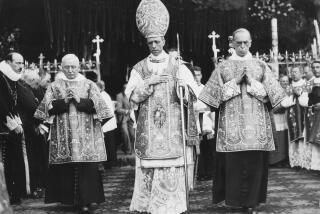KGB Apparently Altered Lithuania War Crimes Data : Baltics: Records supporting charges of exoneration were significantly edited, a Times examination reveals.
- Share via
VILNIUS, Lithuania — The Soviet criminal records in support of charges that the new Lithuanian government is engaged in the wholesale official exoneration of Nazi war criminals were significantly edited before they reached the West, an examination of the originals by The Times has revealed.
The editing removed at least one subject’s claim that he was tortured into confessing to genocidal murder, and it eliminated indications that witnesses against the subjects sometimes qualified their testimony.
Such elements were edited out of at least two key files examined by The Times, almost certainly by the same agency responsible for passing them on to the West: the Soviet KGB. The Soviet spy agency had the records under its control in Vilnius until just after last month’s abortive coup in Moscow, when it abandoned its post here.
The Lithuanians suggest that the KGB may have issued only the most damning information from the records in an effort to embarrass their fledgling nation by reminding the world of part of its dark history.
Rabbi Marvin Hier, dean of the Simon Wiesenthal Center, which first raised the charge that the new Lithuanian government was exonerating war criminals, acknowledged in an interview that the center had in its possession only the partial copies of the records and had not viewed the complete files. He added that the center had “no doubt that these were obtained from Russian sources.”
“That does not offend us at all,” he said. The new information, he said, only underscored his position that Lithuania should refer the rehabilitation cases to independent judicial review before applicants are cleared.
“We would be the last persons in the world to say these matters should not be examined by a judge and jury,” he said. “What we’re repudiating is the right of a government (Lithuania) to interfere” with the record of genocide by unilaterally erasing convictions.
At issue is an 18-month-old program to rehabilitate Lithuanians who were tried, convicted and deported to Siberia by Soviet courts or tribunals after the Soviets overran German troops in Lithuania in 1944. Generally, the charges involve participating in or cooperating with anti-Soviet guerrilla activity, sometimes through collaboration with the Nazis.
Those rehabilitated or their heirs are eligible to collect back pensions or compensation for time spent in the Soviet gulag. The May, 1990, law establishing the program specifically excluded people accused of genocide against the Jews or of killing unarmed civilians.
The Los Angeles-based Wiesenthal Center, a leading institution investigating war crimes, this month publicly questioned whether known war criminals had benefitted from the process. The center released the names of four such individuals and says it is preparing to release five more next week.
In suggesting that Lithuania might have exonerated war criminals, the Wiesenthal Center released only English transcripts of partial trial records. The center said this week that indications that the original records were edited before they were translated do not change its opinion that the rehabilitation process may clear scores or hundreds of possible murderers.
But the edited records illustrate why the Lithuanian government regards the charge of wholesale exoneration to be unfair. They bolster its case that it has made an effort to apply some judicial standards to the evidence of 50-year-old crimes.
Lithuania is trying to reconcile its resurgent nationalism, in which the glorification of wartime resistance to Soviet occupation plays an indispensable role, with the historical reality that many resistance heroes fought the Russians by collaborating with the Nazis. In doing so, they participated in Europe’s greatest human catastrophe: More than 94% of Lithuania’s Jews perished in World War II, most of them from Nazi genocide.
Further driving the controversy are the opposite attitudes of war-crime investigators and Lithuanian officials toward the KGB--the result of sharply differing views of history.
“The historical truth is that we’re not aware of a single document (in a Nazi genocide case) that was doctored by the KGB,” Hier said. He argued that because the Soviets cherished their self-image as Europe’s pre-eminent foes of Nazi fascism, they dared not paint the historical evidence with trumped-up charges.
But Lithuanians view the KGB almost exclusively as the agency that tried to throttle their new nation at birth. Provoking the international outcry over the rehabilitation program was consistent with that aim, they feel.
Emanuelis Zingeris, chairman of the Lithuanian Parliament’s Foreign Affairs Committee and a local Jewish leader, said he participated in the takeover of the KGB building in Vilnius after the August coup. “Somebody there pointed out to me the ‘Jewish section,’ which was aimed at creating conflict between Lithuanians and Jews,” Zingeris said.
Lithuanians also believe the Soviets were more than willing to falsify evidence in the 1940s to imprison or deport property owners, partisan fighters and political enemies. Arturas Paulauskas, the chief Lithuanian prosecutor and a director of the rehabilitation program, said in an interview that in cases without witnesses who testified to seeing criminal acts, his practice was to exonerate applicants if the chief evidence was a Soviet-elicited confession. “What is left is pseudo-proof,” he said.
The government contends it has made a good-faith effort to weed possible war criminals out of the corps of rehabilitated deportees. Out of about 47,000 applicants, nearly 500 have been rejected because evidence exists of their complicity in war crimes. Some of those cases have been referred to prosecutors for reinvestigation.
On the other hand, Lithuanian officials often display an approach that in most other European countries would be regarded as rank insensitivity. Police guards and drivers who took Jews to known killing grounds, for example, are regarded in most countries as accessories to genocide. Not all Lithuanians share that view.
“There were many Lithuanians who as police officers were only assigned to guard people,” said Zenonas Juknevicius, vice chairman of the Parliament’s Justice Committee. “Even if they did not shoot, today they are still being called killers of Jews.”
It is not unusual to hear prominent Lithuanians compare Lithuanian attacks on Jews to Jewish membership in such Soviet agencies as the NKVD, which sentenced thousands of Lithuanians to imprisonment and deportation. “Very often Lithuanians are presented as the greatest supporters of the Nazis,” said Juknevicius, “and who supported the Soviets is forgotten.”
The Lithuanians designed the rehabilitation program to redress what they saw as a Soviet crime against their own resistance heroes. At about the same time, as independence loomed on the horizon, war-crime investigators began contacting government officials to seek their help in unearthing witnesses to or perpetrators of genocide. Sources in the Jewish community here say those requests at first seemed to get little response.
Some well-placed Jewish lawyers approached the KGB in Vilnius, because the Soviets were the only authorities investigating war-time atrocities in Lithuania at war’s end.
Activists here passed at least eight names of possible war criminals to the Wiesenthal Center, along with the advice that some might have been rehabilitated. They say the KGB told them that as many as 120 such people might have been rehabilitated, but before KGB officials could pass along the documentation, the Moscow coup occurred and the KGB offices disappeared.
The documents examined by The Times this week concerned the two most important cases of four raised so far by the Wiesenthal Center, involving soldiers named Aloizas Juodis and Julius Nevera. The Russian-language files were reviewed in Paulauskas’ office with the help of a Times interpreter.
Nevera was convicted in 1948 of anti-Soviet treason and sentenced to 25 years in jail. He confessed to arresting and shooting at least six unarmed Jews including two children as young as 6 and their mother. After Stalin’s death in 1953, he tried to clear his name, a fact not recorded in the papers distributed by the Wiesenthal Center. In 1955, he wrote Lithuanian Soviet authorities that he had been beaten and tortured into signing a confession written in Russian, a language he did not understand.
One witness in the case, a fellow soldier, testified that “some of us” in his detachment escorted an unarmed “Soviet citizen to be executed,” but he did not identify Nevera as being on the squad. A second witness identified Nevera as a “participant” in a “punitive detachment” but did not say specifically what happened in the operation.
Hier, of the Wiesenthal Center, said he was unimpressed by Nevera’s protestations of confessing under duress. “What other defense is available to a man like that?” he asked.
Juodis, the subject of the second case, admitted under interrogation to being a member of the infamous 12th Police Battalion, a Lithuanian unit attached to the German army that is thought responsible for killing as many as 20,000 Jews in 1941.
One witness against him, who was quoted in the Wiesenthal Center material, testified that he knew both Aloizas Juodis and his brother, Zigmas, as battalion members. But in a statement edited out of the English transcript, he amended that to say he actually did not know Aloizas and might not even recognize him. He did testify, nevertheless, that since all battalion members joined in executions “without any exceptions . . . it could not be that Juodis, Aloizas did not participate.”
Paulauskas acknowledged that the witness’ hedging did not, in itself, mean Juodis was innocent of murdering Jews; the 12th Battalion was an infamous weapon of genocide. But he did suggest that those elements tilted the issue in his favor.
Hier responded that the key fact--that Juodis was a member of the 12th Battalion--remained unquestioned. Since the Nuremberg Trials labeled the battalion a criminal organization, he noted, membership in the unit has generally been considered to be evidence of complicity in murder. “Just being a member of the 12th Battalion would make a person subject to deportation from the United States,” Hier said, “and here the Lithuanians are giving him back pay.”
After the New York Times reported the Wiesenthal Center’s contentions on Sept. 5, the Lithuanian government stated that neither Juodis nor Nevera had applied for or received rehabilitation. The Los Angeles Times’s exam of the records established that both were granted rehabilitation.
Also, not all government officials reject KGB evidence as categorically as Paulauskas. As it does every two months, a special commission met in Vilnius this week to consider appeals from those whose applications for rehabilitation had been denied. Most of the nine making appeals protested that: Witnesses against them were biased or dishonest; they committed their alleged crimes in the course of legitimate guerrilla activity, or they were coerced into confessing.
In each case, the evidence was from KGB files. But the commission rejected several appeals on the grounds that the claims were not credible.
One appeal came from the widow of Janos Sendyzo, who had claimed he had been tortured into confessing to the murder of Jews. He had said he had “driven” them to the killing place and guarded them. “He says he was unarmed and on a bicycle when the Jews were being driven to the place of shooting,” the commission clerk reported.
“What kind of guarding is it without a weapon?” asked a skeptical Povilas Varanauskas, a member of the commission and a deputy in the Parliament. “He had a bicycle--what, with just a bell on it?” The commission rejected the appeal.
“Tell his wife it is because he participated in murder,” Varanauskas said.
More to Read
Sign up for Essential California
The most important California stories and recommendations in your inbox every morning.
You may occasionally receive promotional content from the Los Angeles Times.










